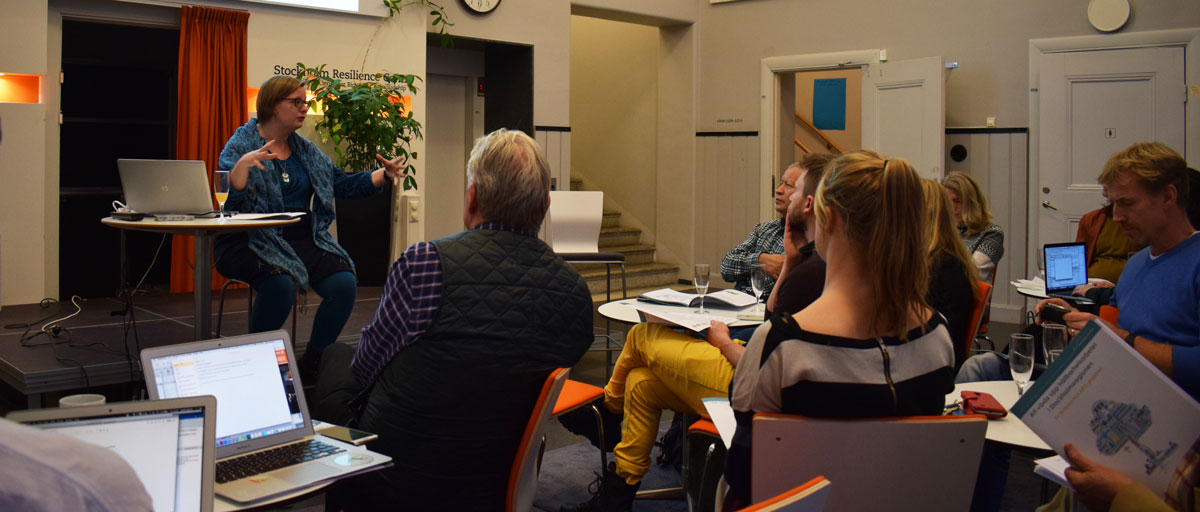
A roadmap for Stockholm to scale up initiatives for sustainability transitions was launched as a result of the 3-year research project ARTS
Bildtext får vara max två rader text. Hela texten ska högerjusteras om den bara ska innehålla fotobyline! Photo: B. Christensen/Azote
urban sustainability
A strategy for sustainability transition in Stockholm
The ARTS project launches a road map for scaling up local sustainability initiatives
- The 3-year research project ARTS has focused on small-scale, local sustainability initiatives
- Scaling up these initiatives requires mechanisms to connect them better to each other
- The roadmap that has been produced for Stockholm can be useful in finding ways to reach the sustainable development goal for cities
We often hear about the many and serious challenges we currently face when it comes to the environment and sustainable development, but there are also many initiatives working to tackle these issues. Such small-scale, local initiatives have been the focus of a 3-year research project that is now coming to an end.
The project, Acceleration and Rescaling Transitions to Sustainability (ARTS), has gathered change-makers in Stockholm, Genk, Budapest, Brighton and Dresden to learn what they are doing and see how sustainability solutions can be scaled up. The 3-year research project has been named "Project of excellence in policy interaction" by the EU commission.
Now they are launching roadmaps for scaling up sustainability in all the five cities including the Stockholm region.
“Since we started ARTS three years ago the UN has adopted the Sustainable Development Goals, with number 11 specifically being about cities. Roadmaps like the ones produced in ARTS can now prove very useful in finding concrete ways of getting to sustainability.”
Thomas Elmqvist, senior advisor in ARTS
Fragmented potential
“The Stockholm region has a lot of potential for transitioning to sustainability,” says Sara Borgström, centre researcher and project leader for ARTS in Stockholm.
“There is a lot of work being done in public and private sectors as well as in civil society, both regionally and locally. In ARTS we have identified opportunities and barriers for the different initiatives, in order to figure out what is needed for them to reach their goals and how we can make sure that the potential the holds is realized also at the regional level.”
Through an interactive research process gathering researchers, artists, volunteers, educators, networkers, activists, public servants and many more, ARTS has investigated the relationships between sustainability actors in the region. What has emerged from the project is a fragmented map where lost connections mean that the full potential of an initiative is often hard to reach.
“It is hard work trying to keep your project alive and make real change,” says Liselotte Norén at the launch of the road map. She runs Refo, one of the initiatives that has been active in ARTS, working with education and design for reuse and remake to create jobs and reduce waste, and also providing disadvantaged children with clothes.
“It feels like each project is its own sparkler – they all burn bright but often too briefly. I wonder what could happen if we could connect them all better so that they could burn together.”
Six focus areas
The roadmap for Stockholm identifies six focus areas that could help advance the efforts of sustainability initiatives:
Smart diversity – decentralisation of projects can make it difficult to keep track, but can also spur innovation and a diversity of solutions. It is important to find a balance in the region between coordinating initiatives and allowing for creativity and diversity.
Connections – there is a need for a proactive and innovative structure for creating and maintaining connections between different initiatives and across decision-making scales.
A catalysing municipality – the municipality needs new competences that can catalyse and support initiatives, while upholding democratic principles and working to promote public interests.
Cross-fertilisation between initiatives – sustainability organisations hold a lot of knowledge collectively, there is a need for platforms where they can learn from each other.
Educational examples – a collection of examples of initiatives, both successes and failed ones, would be useful as a guide for those starting out.
Beyond the sustainability bubble – it is crucial to word for broad participation that stretches beyond the bubble of those who are already engaged. Sustainability initiatives work hard to move past “preaching to the choir” and these efforts need support.
Inspiration and legitimisation
Being part of ARTS has been challenging at times, but in the end very rewarding says Norén:
“It can be a bit daunting to enter the realm of researchers and academics, there are structures and ways of going about things that I don’t always know about or agree with. But as with many challenges it has turned out to be a great experience in the end. I’ve been able to take part in many rewarding discussions, and working with Stockholm Resilience Centre has in some ways increased the legitimacy of our project.”
The roadmap for Stockholm can in the end also be of great importance not only locally but on a global scale.
“Since we started ARTS three years ago the UN has adopted the Sustainable Development Goals, with number 11 specifically being about sustainability in cities, and at the Habitat III conference this years, the New Urban Agenda was presented,” says Thomas Elmqvist, centre researcher and senior advisor in ARTS.
“The New Urban Agenda is good in many ways, but it doesn’t say how to reach to goals. Roadmaps like the ones produced in ARTS can now prove very useful in finding concrete ways of getting to sustainability.”
Sara Borgström has been the project leader for ARTS. She has a long term commitment to both enhance the understanding of as well as contributing to urban sustainable development processes. Her work in the Stockholm-Mälardalen region started during the PhD thesis work, continued through the Ekoklim program and the projects ARTs and COMPLEX.






